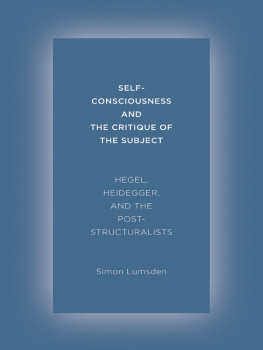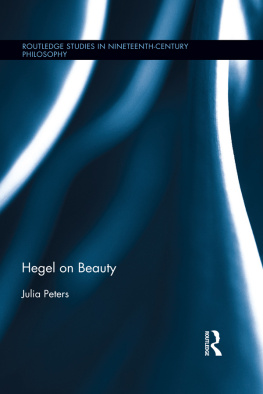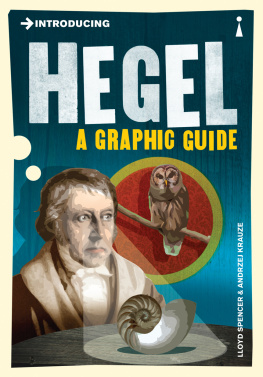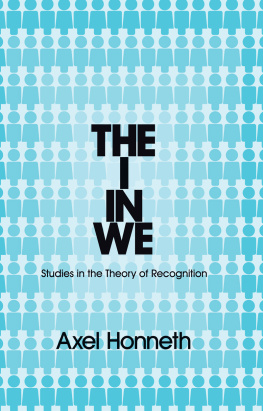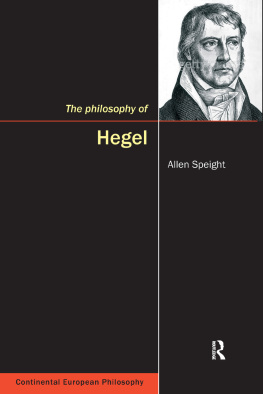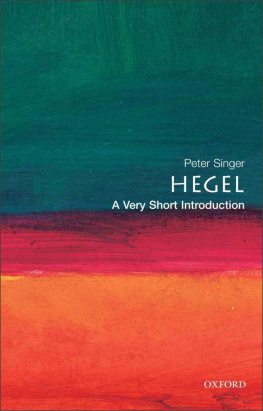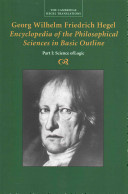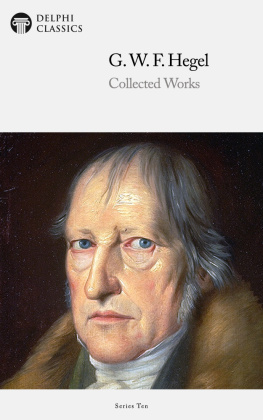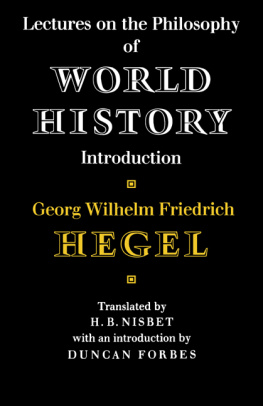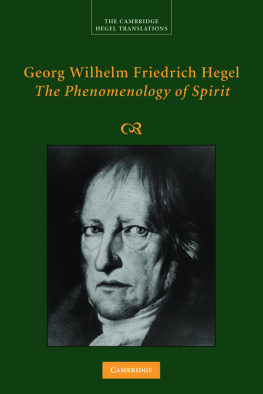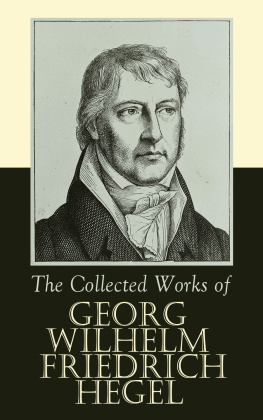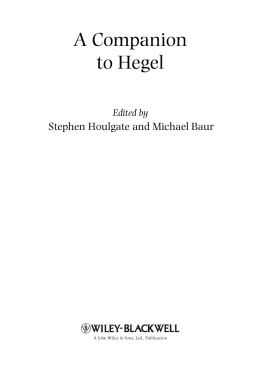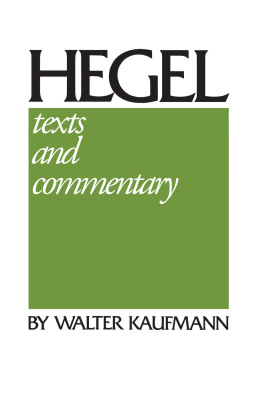SELF-CONSCIOUSNESS AND THE CRITIQUE OF THE SUBJECT
SIMON LUMSDEN
SELF-CONSCIOUSNESS
AND THE CRITIQUE OF
THE SUBJECT
Hegel, Heidegger, and the Poststructuralists
Columbia University Press / New York
Columbia University Press
Publishers Since 1893
New York Chichester, West Sussex
cup.columbia.edu
Copyright 2014 Columbia University Press
All rights reserved
E-ISBN 978-0-231-53820-6
Library of Congress Cataloging-in-Publication Data
Lumsden, Simon, author.
Self-consciousness and the critique of the subject : Hegel, Heidegger, and the poststructuralists / Simon Lumsden.
pages cm
includes bibliographical references and index.
ISBN 978-0-231-16822-9 (cloth : alk. paper) ISBN 978-0-231-53820-6 (e-book)
1. Self (Philosophy). 2. Self-consciousness (Awareness). 3. Idealism, German. 4. Hegel, Georg Wilhelm Friedrich, 1770-1831. 5. Heidegger, Martin, 18891976. 6. Poststructuralism. I. Title.
BD450.L795 2014
126.09dc23
2014001324
A Columbia University Press E-book.
CUP would be pleased to hear about your reading experience with this e-book at .
Jacket design by Martin Hinze
References to Web sites (URLs) were accurate at the time of writing. Neither the author nor Columbia University Press is responsible for URLs that may have expired or changed since the manuscript was prepared.
For Nina Ralph
CONTENTS
This book had its origin some years ago, when I first started teaching at Macquarie University. In that congenial environment Catriona Mackenzie and Ross Poole were early mentors. They provided important advice, encouragement, and support. Nicholas Smith also nurtured my philosophical development and urged me to pursue this project.
I am grateful to the Australian Research Council for granting me a postdoctoral fellowship at the University of Sydney, which freed me from teaching commitments and allowed me to develop much of the research for this book.
At the University of New South Wales (UNSW), Paul Patton and Ros Diprose have been superb mentors. Both have tirelessly offered advice, support, and encouragement. For their help, patience, and confidence in me I am in their debt. I have been fortunate to have very supportive colleagues in recent years in the philosophy program at UNSW. My research has been enriched by discussions with Joanne Faulkner, Catherine Mills, and Heikki Ikheimo. All are superb colleagues and great friends. Thanks also to the extraordinary administrative staff in the School of Humanities, especially Sam Russell, Sally Pearson, and Taline Tabakyan-Golino.
The Faculty of Arts and Social Science at UNSW materially supported this project with two research grants. One enabled me to reduce my teaching commitments for a semester, another assisted with the publication of the manuscript. The granting of a six-month study leave in 2010 also facilitated the completion of the manuscript.
Thanks to Jean-Philippe Deranty, Robert Sinnerbrink, Diane Perpich, Marguerite La Caze, Simon Duffy, Emily Zakin, Karen Houle, James Vernon, Paul Ashton, Iain MacKenzie, and Alison Ross for either reading early drafts of chapters or providing me with congenial environments in which to present drafts. To Wayne Martin I owe special thanks. His advice at critical stages in the development of this project and his encouragement of my research on German idealism facilitated the completion of this manuscript and its publication.
I would like to thank the staff at Columbia University Press. Wendy Lochner, the religion and philosophy senior editor, encouraged me to pursue the project. Christine Dunbar, the editorial assistant, has been extraordinarily professional, patient, and helpful. Thanks to my copyeditor Robert Demke, whose changes substantially improved the book.
Thanks also to two anonymous reviewers who read the manuscript in its entirety and offered very helpful suggestions for improvement.
I have been blessed with great teachers. Lisabeth During and Genevieve Lloyd at UNSW introduced me to Hegel and the history of philosophy as an undergraduate. I thank them for their early encouragement. Paul Redding was the ideal doctoral supervisor at the University of Sydney, a man of extraordinary integrity and generosity, who regardless of the many demands on his time has always found time to support me as well as my research. Without his guidance and encouragement this project and many others would have never been undertaken, let alone completed. His own research on German idealism and the exemplary ways with which he treats his duties as an academic are models I can only hope to emulate.
I am indebted to Amir Ahmadi, Lone Bertelsen, Andrew Murphie, Richard Smith, Dan Smith, Sarah Sorial, and Lisa Trahair for their support and friendship during the writing of the manuscript.
Judy Morris, Joanie Clark, Kenny Little, and Clarissa Little have helped me in many ways. The daily walk of our ragtag pack of mongrels through the sprawling and derelict grounds of the former psychiatric hospital, Callan Park, allows me to recover from the torturous complexity of philosophy and the managerialist strictures of the Australian university. I thank them for their friendship, good company, and generosity. To the dogs of Callan ParkLily, Buster, Bonnie, Baxter, and my beloved but sadly no longer living Kirby and GeorgieI owe special thanks for showing me the important limits to the space of reasons.
I am grateful to my parents Janice Mary Lumsden and Ian Lumsden, who have been supportive throughout, as have my de facto in-laws Warwick Ralph and Carol Ralph. A special thanks to my partner, Nina Ralph, who read the entire manuscript. Her suggestions greatly improved the book. For her patience, calm, and care and much else I am grateful. I dedicate this book to her.
Thanks are due to the following publishers for allowing me to use previously published material. was previously published as Deleuze and Hegel on the Limits of Self-Determined Subjectivity, in Hegel and Deleuze: Together Again for the First Time, ed. Karen Houle and James Vernon (Evanston, Ill.: Northwestern University Press, 2013).
References to and citations of frequently cited works are given parenthetically in text using the following abbreviations.
GILLES DELEUZE
| DR | Difference and Repetition. Translated by Paul Patton. New York: Columbia University Press 1994. Diffrence et rptition. Paris: Presses Universitaires de France, 1968. French page numbers follow page numbers from the English translation. |
| NP | Nietzsche and Philosophy. Translated by Hugh Tomlinson. New York: Columbia University Press, 1983. |
JACQUES DERRIDA
| GD | The Gift of Death. Translated by David Wills. Chicago: University of Chicago Press, 1995. |
| M | Margins of Philosophy. Translated by Alan Bass. Chicago: University of Chicago Press, 1982. |
J. G. FICHTE
| EPW | Fichte: Early Philosophical Writings. Translated and edited by Daniel Breazeale. Ithaca: Cornell University Press, 1988. |

